#may the final gif manifest into a real-life third for her
Text






2024 NOMINEES: Best Performance by an Actress in a Featured Role in a Musical - Bebe Neuwirth (Cabaret at the Kit Kat Club)
Past nominations:
Best Featured Actress in a Musical - Sweet Charity (1986)
Best Actress in a Musical - Chicago (1997)
Best Featured Actress in a Musical - Cabaret (2024)
With Allison Williams in Sweet Charity (📸: Martha Swope) / With Ann Reinking in Chicago (📸: Dan Chavkin) / With Steven Skybell in Cabaret (📸: Marc Brenner)

#bebe neuwirth#tony awards#broadwayedit#theatreedit#mygifs#can it be? three-time nominee two-time tony award winner bebe neuwirth???#may the final gif manifest into a real-life third for her#like the award i am still shaking (so fucking happy she deserves it <333)
31 notes
·
View notes
Text
Favorite Albums of the 10s
25. Shaking the Habitual- The Knife
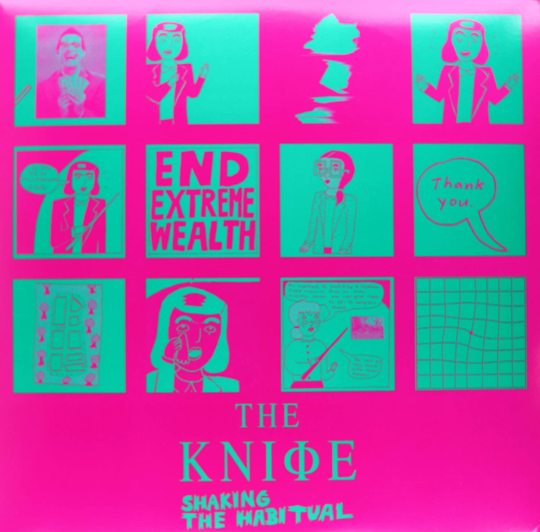
The Knife made a name for themselves with their third and most celebrated LP, Silent Shout, but it’s their fourth LP, StH, that pushed their idiosyncratic blend of electroacoustic synth-pop to the furthest, most far-flung places that they’ve gone yet. The record deals with a diverse range of topics from the surveillance state, to fracking, pollution, gender discrimination, and unchecked greed with colorful, ketamine-fused candy cotton synth work and ritualistic percussion. There are long passages of ambience like the menacing build of “A Cherry on Top” dispersed between roaring apocalyptic dance numbers like the astonishing industrial eruption “Full of Fire” and the electro-acoustic freak out “Without You My Life Would Be Boring”. With the exception of the mid-album ambient epic “Old Dreams Waiting to Be Realized” every song on StH justifies its length with consistently engrossing arrangements that sustain their momentum without compromising an ounce of their potency. Everything about the record lives up to its title, from its thematic ambitions, to the breadth of the sonics, pacing, and performances themselves. StH if the full manifestation of the darkness that was lurking beneath the surface of their music from as early as their breakout single “Heartbeats”, but thankfully the music never collapses under the weight of their thematic concerns. Their resilience remains inspiring all these years later, and if Karin and Olof never reunite for a fifth LP we couldn’t have asked for a better send off.
Essentials: “Full of Fire”, “A Tooth for an Eye”, “A Cherry on Top”
24. XXX- Danny Brown

Hip-hop grew to remarkable heights throughout the 10s, and yet there were few rappers that displayed the level of growth and consistency from record to record throughout this past decade quite like Danny Brown. The Detroit native spent the aughts hustling the mixtape circuit, finally catching a spark with 2010’s The Hybrid, his strong debut LP. But a year later Brown returned with his sophomore LP and magnum opus XXX, a twisted rap odyssey that ignited the blogs, and signaled that a new era of hip hop was beginning to emerge. XXX found Brown rapping over an assortment of wonky boom-bap instrumentals courtesy of Bruiser Brigade producer Skywalker that fused classic hip-hop, trap, baroque pop, and techno into shapes far more disorienting than the beats that the vast majority of his contemporaries were rapping over. While it was evident beforehand, XXX really cemented the notion that Brown could rap over anything. The beats here are generally extremely impressive, and there are plenty of singular stylistic touches like the slurring violin stabs of “Lie 4”, the menacing synth lurch of “Monopoly”, or the distorted brass loops of closer “30”, that really stand out, but the appeal is first and foremost Brown’s rapping. His voice alone is one of the most versatile and unpredictable instruments in hip-hop, but aside from his masterful vocal alteration, always perfectly synched to the tone of any given moment on any given song of his, he’s a naturally gifted writer, as thoughtful as he is straight up hilarious. Whether bragging about his destructive lifestyle (“Die Like a Rockstar”), describing how much he loves cunnilingus “I Will”, mourning the desolation around him “Party All the Time”, or reveling in his come-up “30”, Brown is a thoroughly engaging presence throughout the entire album. On XXX profanity and profundity march gleefully hand in hand with one another, casting Brown as one of the last decade’s most singular voices.
Essentials: “Die Like a Rockstar”, “Monopoly”, “30”
23. House of Sugar- Alex G
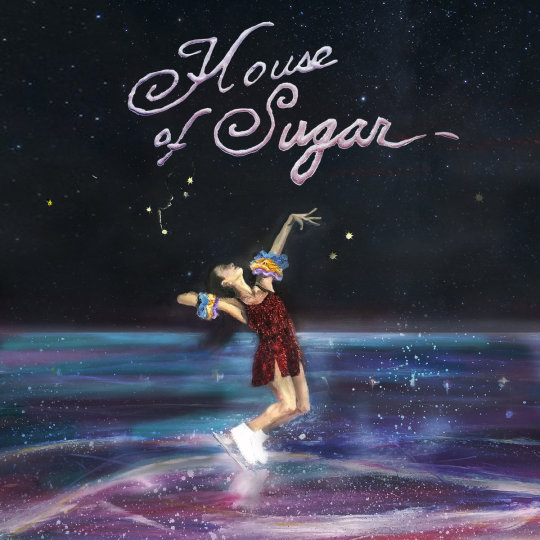
On Alex G’s latest LP, House of Sugar, his concoction of warm guitar pop and warped electronic production reached a new peak. The songs on HoS detail the misdeeds of various characters succumbing to their greed, and the vignettes that he paints are growing increasingly well-realized thanks to a continuously sharpening songwriting voice and a plethora of tasteful pitch-shifted vocals that help imbue his characters with color and personality. HoS opener “Walk Away” provides a reasonably sonic barometer for what’s to come before dropping us into a series of the most immediate pop songs that he’s ever penned. “Hope” and “Southern Sky” are nimble acoustic guitar pop songs that are almost disarming in their immediacy, and framed around references to the real life death of a friend of his due to opioids and a dream he had, respectively. By the time we reach acoustic guitar and sitar-drone of “Taking” the pitch-shifted vocals are at the forefront of the music and HoS shifts gears into its abstract middle section which owes a lot to the new-age beat deconstruction of avant-garde electronic producers, specifically Oneohtrix Point Never. On the instrumental “Sugar”, a sublime concoction of pitch-warped whispers, dissonant strings arpeggios, and creeping acoustic guitar plucks, HoS reaches the depths of its depravity. The next song, “In My Arms”, leads us to the suite of sublime acoustic reveries that close HoS, arguably peaking with the gorgeous acoustic love ballad “Cow”. The dramatic sonic left-turn that HoS takes midway through may leave some new listeners a little cold, but for most Alex G fans nothing about the eclecticism of HoS should come as a surprise. Nor should the overwhelming quality of the songs here. From Alex G’s debut, Race, in 2010 up through HoS, he released a remarkable catalog of some of the most eclectic, and vital indie rock of the century, and I have no reason to believe he won’t top HoS at some point.
Essentials: “Gretel”, “Sugar”, “Walk Away”
22. Sea When Absent- A Sunny Day in Glasgow

A Sunny Day in Glasgow may be one of the 21st century’s most underrated bands, but not even Pitchfork could resist the coveted BNM tag when it came time to review their fourth and strongest LP, Sea When Absent. Building off of their first three idiosyncratic LPs that superbly fused electronic pop with shoegaze and dream pop, A Sunny Day in Glasgow moved into decidedly more psychedelic territory with their fourth LP while still retaining the sharp melodic sensibility of those first three. Much of the shift is easy to credit to vocalist Jen Goma who joined the group on their third LP, Autumn Again, and here her soaring vocals deliver rich melodies that are more fleshed out and focused than anything on their past releases. SWA sidesteps the kaleidoscopic sprawl of their 22 song sophomore LP, Ashes Grammar, and instead delivers 11 tight, stargazing pop songs. Whereas on the prior records it more often than not felt like the band were throwing ideas at the wall to see what stuck (with primarily successful results) on SWA the band commit more thoroughly to their ideas, writing songs that are well within their wheelhouse but have never been so well-realized. “Byebye, Big Ocean (The End)” and “Boys Turn Into Girls (Initiation Rites)” erupt with a wall of dazzling distorted guitars that slowly build into engrossing melodic payoffs while “Never Nothing (It’s Alright (It’s Ok))” and “The Body, It Bends” are sublime, soft spoken breathers that put a premium on texture and melody, and are among A Sunny Day in Glasgow’s most impressive songs yet. Even seemingly inconsequential moments like the “Double Dutch” interlude positively radiant with melodic warmth and joyous energy. Their strain of sun-kissed, jubilant dream pop tonally stands in stark contrast to much of the pop that’s dominated the airwaves this past decade, but their temperament doesn’t sound naïve so much as defiant. They have yet to follow up SWA with another LP, and I can’t blame them if they feel like they’ve said everything that they have to say with SWA.
Essentials: “The Body, It Bends”, “Never Nothing (It’s Alright (It’s Ok))”, “Boys Turn Into Girls (Initiation Rites)”
21. Strange Mercy- St. Vincent

Annie Clark has spent the past decade releasing music under her St. Vincent moniker, collaborating with the likes of David Byrne, producing for Sleater-Kinney, and appearing on the sketch comedy Portlandia. Although she began her solo career in earnest with her strong 2008 debut, Marry Me, in 2011 Clark released Strange Mercy, her third, and strongest record to date. Produced by John Congleton, SM is a compelling fusion of art rock/and chamber pop that often lands with a jarring, visceral impact, but is still imbued with a sense of grace that heightens the sentiments of her bewitching songwriting. Her first two records showcased her singular voice and tastefully, ornate baroque arrangements, but on SM Clark begins to let loose and lean into her virtuosic guitar playing. Songs like “Cruel” and “Northern Light” are propelled by her nimble riffs caked in distortion while strings rise and fall in a satisfying sweep all around her triumphant vocals. “Surgeon” brings the pace down to a crawl and gets a tone of mileage out of sensuous synth arrangements as Clark sings softly of depression and carnal desire “Stay in just to get along/Turn off the TV, wade in bed/A blue and a red/A little something to get along” before the song erupts into a furious storm of guitar distortion. The balance between fury and serenity animate the record from start to finish, and Clark seamlessly toggles these impulses from start to finish. On the title track, over a lumbering tom/kick drum rhythm, the incessant ping of a synth, and bluesy guitar licks Clark brilliantly sums up the record’s theme with a scene of police brutality “If I ever meet that dirty policeman that roughed you up/No, I, I don’t know what” that depicts the contraction inherent in the way justice is carried out by police in the west, and the way those contradictions bleed through to our understanding of morality on the whole. SM is a record full of these sorts of messy contradictions, and the music constantly reflected that perpetual sense of disarray with songs as colorful and chaotic as they were controlled.
Essentials: “Northern Lights”, “Surgeon”, “Strange Mercy”
20. A Moon Shaped Pool- Radiohead

Radiohead’s eighth LP, 2011’s solid but unremarkable King of Limbs seemed to cement the notion that while Radiohead may not have another game changer left in them, they were probably weren’t ever going to make a bad record. And with all of their various solo pursuits it seemed plausible that we may never get another Radiohead record, as underwhelming as capping off a career as thrilling as theirs with KoL would have been. Thankfully things didn’t pan out that way, and in 2016 Radiohead released their ninth LP, A Moon Shaped Pool; the platonic ideal of a master stroke from a legacy act. The album is partially composed of older songs re-worked into new forms, such as the tense string onslaught of opener “Burn the Witch” while a few of the newer songs like the gorgeous, ambient “Daydreaming” are string-laden compositions that are as eerie as they are radiant. For a band that’s been prophesizing the increasingly dismal state of the world that we now find ourselves in for the past several decades, they sound increasingly comfortable with their position in the world, and there’s no question that they’re in full command of their craft here. The production is sublime throughout the entire record, with a sense of encroaching doom bubbling just beneath the surface juxtaposed against rich baroque instrumentation. AMSP is the Radiohead album most informed by Johnny Greenwood’s work scoring films like There Will Be Blood and Phantom Thread, and as a result there’s a remarkable sense of immersion at work even for a Radiohead album.
So while there are some recognizable forms from records past, such as the brass-lead krautrock strut of “Ful Stop”, or the twitchy IDM drum work of “Identikit”, the spectral production heightens the potency of everything here. The compositions on AMSP are the most elegant, and nuanced of Radiohead’s to date, and Yorke’s voice continues to age superbly. Yorke’s lyrics touch on familiar topics, more relevant now than ever, such as climate change on “The Numbers” “The numbers don’t decide/The system is a lie/A river running dry/The wings of butterflies” the dangers of unchecked authority on “Burn the Witch” “Abandon all reason/Avoid all contact/Do not react/Shoot the messengers/This is a low-flying panic attack” and the broader, horrific realities of the world that we live in on “Ful Stop” “Why should I be good if you’re not?/This is a foul tasting medicine/A foul tasting medicine/To be trapped in your ful-stop”. What’s more unexpected are songs like the graceful string-led “Glass Eyes” and the devastating ambient closer “True Love Waits”, two songs that are poignant tributes to Yorke’s ex-wife, Rachel Owen, who passed away from cancer in late 2016. AMSP isn’t just a spectacular late-career gem that would make a superb swan song; it’s also the most human record that Radiohead have made yet.
Essentials: “True Love Waits”, “Daydreaming”, “Ful Stop”
19. Eye Contact- Gang Gang Dance

Few bands set the tone for the kind of cross-culture hybridization that would become the sonic norm for music throughout this decade quite like Gang Gang Dance. Throughout the early aughts they cut their teeth in the Brooklyn noise scene alongside bands like Animal Collective, Black Dice, and Exceptor blending noise, experimental rock, and worldbeat into blistering, unconventional shapes. As the years progressed Gang Gang Dance gradually began to open up their sound, folding elements of hip-hop, dance music, and psychedelic pop into a colorful concoction of rhythmically robust, delightfully manic pop music that was just as forward-thinking as it was infectious. The shift really began on their criminally underrated 2005 LP, God’s Money, but began notably on their terrific 2008 LP, Saint Dymphna. On the follow-up to SD, their remarkable fifth LP, Eye Contact, the sound of Gang Gang Dance crystallized into something more immediate and far-ranging than anything that they had done prior (or since so far). On EC, everything that the band had attempted throughout the course of their career (tribal rhythms, eastern melodies, shards of refracted noise) was gloriously combined into a hyper-saturated tapestry of progressive future pop. EC is the peak of Gang Gang Dance’s prior decade of sonic exploration, and nearly a decade later there’s still nothing that sounds anything like it.
Beginning with the astonishing slow-burn intro of “Glass Jar” that finds the band patiently building up what begins as a pent up ambient composition toward something more volatile that eventually rips open midway through, spilling into a calamitous, euphoric release into the song’s second half, EC is bursting with joyous energy and possibility. The melodies are some of the sharpest, and most direct that vocalist Lizzi Bougatsos has ever penned, providing a warm immediacy that cuts through even the most outre arrangements here, and they continually expand into shapes as the songs continue to progress. “Adult Goth” and “MindKilla” are bolstered considerably by Lizzi’s dynamic vocal performances, and the off-kilter, spellbinding synth arrangements of the band’s keyboardist Brian DeGraw, while “Romance Layers” provides an ideal mid-album psychedelic breather.. And on the album’s closer, “Thru and Thru”, the band deliver a send-off that succinctly sums up a prior decade’s worth of experimentation into a nearly six-minute song overflowing with eastern melodies, mesmerizing chants, and infectious tribal rhythms that congeal into a sound that couldn’t possibly be mistaken for anyone else. Although they’ve only graced us with the somewhat underwhelming 2018 record Kazuashita since, when Gang Gang Dance are firing on all cylinders, as they are on all of EC, there’s simply nothing like it.
Essentials: “Glass Jar”, “Adult Goth”, “Thru and Thru”
18. Shields- Grizzly Bear

Although the zeitgeist was already beginning to dramatically shift by the time that Grizzly Bear released their fourth LP, Shields, guaranteeing that it wouldn’t have the same immediate impact that they enjoyed with its predecessor, their 2009 breakout LP, Veckatimest, they still ended up releasing their magnum opus. Compared to Veckatimest’s approachable folk-pop leanings there are moments on Shields that sound downright prog, but the band never let these intricate baroque pop/psychedelic folk arrangements get away from themselves or compromise the remarkable melodic instincts that were undeniable on their terrific sophomore LP, Yellow House. The ten songs throughout Shields are perfectly paced, and there isn’t a single moment that overstays its welcome, but they each develop just as much as they need to. The band’s primary songwriters, Edward Droste and Daniel Rossen, were each peaking as singular songwriters in their own respective rights on Shields, and they both deliver a handful of the band’s strongest songs to date. Droste’s songs tend to creep in ethereal waltzes with delicate baroque instrumentation (“gun-shy”, “A Simple Answer”) unfolding patiently while sustaining a remarkable sense of tension while Rossen’s are jaunty folk rippers that unfurl in unpredictable, and thrilling cacophonies that still retain the grace that the ornate instrumentation demands (“Yet Again”, “Speak in Rounds”) but unfurl in far more complex structures than those on Veckatimest.
Grizzly Bear’s progression from Droste’s cozy lo-fi folk bedroom project to a knotty baroque folk juggernaut was one of the most quietly satisfying of any band from the past decade, and on Shields they hit a gorgeous peak. While Droste and Rossen had peaked as songwriters here, their contributions never overshadowed those of Chris Taylor or Chris Bear, and the chemistry on Shields is sharper than most bands ever come close to achieving. It’s easy to get lost admiring the sheer craft of their meticulous arrangements, crisp production, provoking but elusive songwriting, and the sharp interplay between Droste and Rossen each on their own individual merit, but on Shields everything that previously stood out about their artistry is amplified, and congealed in a way that’s approachable yet inimitable. On Shields Grizzly Bear umped the ante from Veckatimest on both fronts, and proved that they could grow more immediate and melodic while still dazzling with rich compositional complexity. Grizzly Bear followed it up with Painted Ruins in 2017, that while a perfectly good record in its own right is nowhere as cohesive, and most unfortunately, patient. And to be honest, I haven’t heard a baroque folk record released since Shields that’s as consistently engrossing, or one performed with such remarkable execution. Shields isn’t their most immediate, but it best distills their singular essence, and its generosity knows no bounds.
Essentials: “gun-shy”, “Yet Again”, “The Hunt”
17. The Money Store- Death Grips
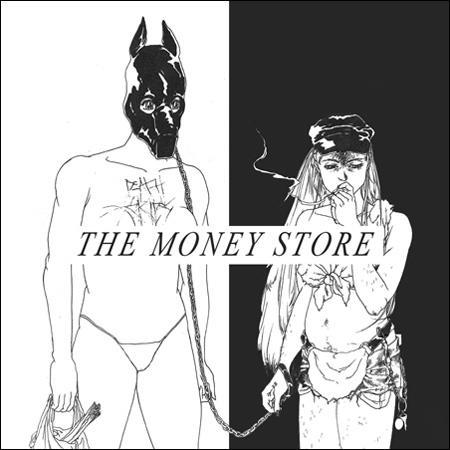
Anyone from future generations looking to hear a band that’s most emblematic of the 10s as a full decade probably couldn’t do better than Death Grips. The trio consisting of vocalist MC Ride, keyboardist/producer Flatlander, and drummer Zach Hill released their abrasive Ex-military tape in 2011, and right out of the gates the trio had a fully-formed sound that plucked unapologetically from west coast hip-hop, industrial, hardcore, and noise. Although far from the first band to draw equally upon genres like these, Death Grips stood out immediately thanks in no small part to MC Ride, who has since proved to be one of the last decade’s most compelling frontmen. His lyrics are cryptic, and intelligent yet visceral, with a deceptively wry edge. Although there’s quite a bit of variety to his delivery, it’s always propelled forth with an overwhelming intensity that can take some time to become accustomed to. Ex-military was received rapturously by critics and bloggers, but as exciting as group like them may have seemed at the time it would have been hard to predict any kind of real longevity for them. And their unrelentingly antagonistic streak (leaking No Love Deep Web, putting a picture of Zach Hill’s dick on the cover of said album, skipping performances or just playing recorded music instead of performing, trolling fans, faking a breakup) would have decimated the momentum of almost any other band, but Death Grips feed on this sort of chaos like a troupe of anarchist vampires. Their arc from Ex-military to 2018’s Year of the Snitch is one of the most rewarding streaks of any act throughout the 10s, and while most of these records are great, there isn’t one that better distills their essence than their 2012 debut LP, The Money Store.
While Ex-military presented them as an admittedly idiosyncratic, yet undeniable product of their environment, TMS blew their sound wide open proving that they had range far beyond sounds of their native state. Right from the bass arpeggios that jolt opener “Get Got” to life, it’s clear the fidelity has improved considerably, but they haven’t compromised an ounce of their fury. This still scans as music custom-tailored for little other than violently thrashing your limbs, and little else from the past decade as been anywhere near as effective at distilling that aesthetic so neatly across the run of a single record. But on TMS Death Grips were still writing actual songs, with memorable hooks, sticky melodies, and conventional structures that served to heighten the potency of their tantrums. Songs like “I’ve Seen Footage” and “Hacker” are shocking for how immediate and unthreatening the band sound despite MC Ride’s sour bark, while songs like “The Fever (Aye Aye)” and “The Cage” showcase early peaks for Flatlander’s immaculate, and underrated synth work. MC Ride is at his best here, whether talking shit and espousing authenticity (“Hustle Bones”), calling out doubters (“Bitch Please”), or just railing against general conformity, he delivers 13 career defining performances in neat succession. Death Grips have continued to relentlessly experiment on all their subsequent records, and while some have come close to matching the excellence of TMS, they’ve all fallen short. Thankfully, the immense exhilaration and urgency of TMS sound more potent with each successive year that we inhibit this desolate hellscape.
Essentials: “I’ve Seen Footage”, “The Fever (Aye Aye)”, “Hacker”
16. Twin Fantasy (Face to Face)- Car Seat Headrest

It shouldn’t come as any surprise that a re-recording of a devastatingly personal LP that Will Toledo recorded at 19, with better production, stronger arrangements, and cleaner vocals, would end up being his best record to date. What was surprising was that he decided to return to the record of his that’s most important to him, and give it the sort of justice that it deserves after having developed into a far more adept talent in the years following its release. And although I’m sure some of those songs (if not all of them) were painful to revisit, the discipline and audacity paid off enormously. Twin Fantasy centers entirely around falling in love with another man at 19, and the arc of their relationship from mourning the distance between them on the opening song “My Boy (Twin Fantasy)” to the newfound acceptance of their relationship’s dissolution on closer “Twin Fantasy (Those Boys)”, detailing the highs and lows with unabashed sincerity. While the original still holds up fairly well, there’s no question that the re-arranging, cleaner vocals, and stronger fidelity overall just heightened the potency of what was already there without diminishing any aspect of the original record. Will’s cleverness, sense of humor, and dynamism as a bandleader elevate TF beyond a melancholic teen drama into a searing document of formative growth, demonstrating craft, ingenuity, and wisdom far beyond his years. More so than any other record released throughout the last decade, TF exemplifies just how potent indie rock still is.
This new version of TF is more of a “re-imagining” of the original record than anything else, and as such the thematic scope as it initially existed, along with the exact same track listing, is held perfectly intact. The record’s two epics, those being “Beach Life-In-Death” and “Famous Prophets (Stars)” are both even longer, and benefit more so than anything else here from their new arrangements. The fidelity has been cleaned up notably, but TF is still far from overproduced, and without any fuzz obscuring a lot of the detail you can hear just how crisp, and superbly layered these arrangements are. The new-wave outlier “Nervous Young Human” practically radiates with a newfound sheen, and is handedly the most radio-ready song the band have ever written, but it still folds seamlessly into the record’s mid-section between the anthemic, distortion-fueled peaks of “Sober to Death” and the record’s mid-album power-pop stunner, “Bodys”. Toledo’s drawing from a great deal here of different sub-genres here, and he manages to land on a remarkably uniform sound that belies the myriad of intricacies at work that prevent these compositions from being crushed underneath the weight of their own ambition. The album’s greatest achievement is how deftly Will manages to tell a story about the most profound event of his life coupled with music that’s as multi-faceted as the human experience being conveyed. TF may be proudly out of step with the current cultural zeitgeist from a sonic perspective, but the sentiments conveyed throughout are sublime missives from a distinctly millennial outlook. As far as concept albums about a single relationship are concerned, Toledo has set the bar this century with TF.
Essentials: “Famous Prophets (Stars)”, “Beach Life-In-Death”, “Bodys”
15. Modern Vampires of the City- Vampire Weekend
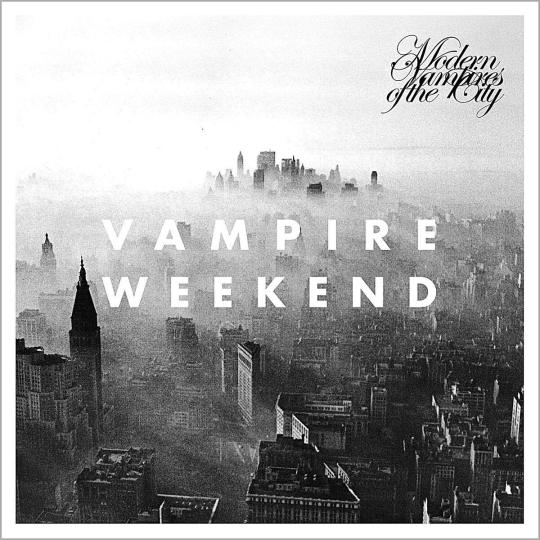
Vampire Weekend have come a long way from the indie afro-pop roots of their debut to their pastoral, jam band informed fourth LP, Father of the Bride, but on their third LP, Modern Vampires of the City the band refined their sound to a sublime strain of chamber music and art pop filled with Ezra Koenig’s strongest writing to date. Whereas their first two records were entirely produced by the band’s multi-instrumentalist and not-so-secret weapon Rostam Batmanliij, on MVotC Ariel Reitscheid, a producer known for working with acts like Charli XCX, Haim, Solange, etc joined the proceedings, and there’s a lighter feel to a lot of the arrangements, but everything has more dimension overall, and the low-end really pops on a lot of these in a way that it hadn’t really before. There are plenty of welcome production choices throughout, like the sprinkling of auto-tune on “Step”, or the blistering saxophone solo on “Worship You” that do a great deal to expand the parameters of the band’s sound without ever finding them really going out of their depth. Compared to their prior records there’s a fairly vast tonal gap on MVotC, with a heightened sense of existential dread and fixations on mortality, nostalgia, and faith. It’s weighty stuff without question, and the exceptional pacing goes a long towards helping evenly pack in the melancholic, languid compositions like “Everlasting Arms” and “Don’t Lie” with infectious up-tempo numbers like “Diane Young”, “Unbelievers”, and “Finger Back” that, while far from the best of what’s here are still as immediate as anything they’ve ever released and benefit from the same immaculate arrangement, production, and writing as everything else here even if they don’t break as much new ground. But the best of what’s here are without question among the best pop songs released so this far century.
Both opener “Obvious Bycycle” and “Step” are devastating looks at nostalgia that frame Ezra’s thoughtful character sketches in rich compositions that in the case of the former consist of soft wisps of grand piano, percussion that sounds like a stamp being punched, and surprisingly visceral bass, while in the case of the latter the band opt for gorgeous harpsichord arrangements, and a swaggering bassline. But “Hannah Hunt”, which is for the record the best VW song to date, is on another level entirely. It opens like the sun after the storm with field recording of a crowd of people clearing away for delicate grand piano and the gentle rumble of bass. Ezra sings of a relationship slowly starting to break apart as a couple travels the country together “A gardener told me some plants move/But I could not believe it/’Til me and Hannah Hunt/Saw crawling vines and weeping willows”. The song slowly builds into a rousing baroque pop crescendo over roaring keys as Ezra delivers one of his most devastating lines to date “If I can’t trust you then damn it Hannah/There’s no future, there’s no answer/Though we live on the US dollar/You and me we got our own sense of time”. Rostam left VW in 2016, and although their first record without him, the aforementioned 2019 comeback LP, FotB, his absence was sorely felt. On “Hudson” it almost sounds like Rostam is singing to Ezra, under that lens especially, it’s functions as a poignant, but fitting cap to VW’s first era. As great as FotB, Rostam’s 2017 debut Half-Light, and I Had a Dream That You Were Mine, his 2016 collaboration with Hamilton Leithauser of The Walkmen, I hope that MVotC isn’t the last time the two of them work on a full LP together.
Essentials: “Hannah Hunt”, “Step”, “Ya Hey”
14. Channel Orange- Frank Ocean

Few albums released throughout the last decade have brought about the sort of sweeping sea change that Frank Ocean’s sublime debut LP, Channel Orange, did. Ocean’s kaleidoscopic, self-released 2011 mixtape Nostalgia, Ultra established his artistry as something far beyond that of the go-to hook ghostwriter identity he cut his teeth establishing for himself. A year and a half later, amidst signing to Def Jam, collaborating extensively with Tyler, the Creator, Kanye West, and Jay-Z, and writing a now legendary tumblr post stating that his first love was for another man a few days before releasing his immensely anticipated debut LP, Frank Ocean released that album, and decided to call it Channel Orange. Like Ocean’s music itself, the narrative surrounding his ascension feels both timeless (moving to LA after Hurricane Katrina struck his hometown of New Orleans, ghostwriting and joining Tyler, the Creator’s hip-hop collective Odd Future before releasing his own music, which drew primarily from soul, classic r&b, and funk more than anything that was on the radio at the time) and modern (sampling extensively on N,U, having a few key co-signs that seemed to unlock all the right connections, leveraging the power of the internet along with the rest of Odd Future to build and sustain a fanbase) but none of it would matter if the music didn’t live up to the hype. But all of this is particularly interesting to consider when talking about CO, especially considering that it’s the best debut LP of the 10s, and an absolute master class in songwriting.
CO is a remarkably fully-formed debut LP that finds Ocean in complete control of his craft on all fronts. The instrumentation is a lush palette of analog keys, bass, and strings, and with the exception of a few fairly stripped down ballads, shows a keen command for maximalism that never sounds overwrought. Even a song like the colossal, mid-album change-up “Pyramids”, is saved from complete indulgence after the beat seamlessly shifts into a woozy down-tempo trap instrumental with plenty of space for Ocean’s falsetto to linger in. Ocean would shift gears dramatically with the 2016 visual album, Endless, and his second studio LP, Blonde, trading in the rich, dense analog soul and r&b for a minimal psychedelic soul sound. While the production on Blonde and Endless is more impressive than that of CO, neither record was quite able to match the lush immediacy that seemed to come to Ocean so naturally here. Ocean produced the record alongside the musicians Jonathon Ikpeazu, Malay, and Om’Mas Keith who all provided additional keys, drum programming, and/or guitars. Earl Sweatshirt, Tyler, the Creator, and Andre 3000 are the only guests that provide verses, and while each completely delivers, CO is Ocean’s record through and through. Regardless of whether Ocean is singing about the emptiness of privilege (“Super Rich Kids”), or depicting a tale of someone’s life falling apart due to crack addiction (“Crack Rock”) or delivering the closest thing he’ll likely ever come to a straight forward love song (“Thinkin’ Bout You”) his eye for detail, wit, intelligence, and empathy render the characters as rich, and multi-faceted regardless of what angle he’s coming at them from. The warmth and immediacy of the instrumentation and Ocean’s voice draws you in, but it’s the sheer strength of his songwriting that elevates CO from simply being another immensely promising debut to the classic that it is.
Essentials: “Crack Rock”, “Bad Religion”, “End / Golden Girl” ft. Tyler, the Creator
13. Sunbather- Deafheaven

Deafheaven were far from the first band to blend black metal, shoegaze, and post-rock, but on their stellar 2013 record Sunbather they distilled elements of these genres into a punishing, and breathtaking sound that’s unmistakably theirs. Their solid 2010 debut Roads to Judha showed tremendous promise, but their songwriting wasn’t on par with their ambitions yet. But on Sunbather, Deafheaven lived up to that early promise. Sunbather is primarily a blistering fusion of black metal drumming and shrieks engulfed in walls of shoegaze guitar that often give way to instrumental outros that shine with the radiance of Sigur Ros or Explosions in the Sky. George Clarke delivers the lyrics in an indecipherable shriek that either amplifies the intensity of the surrounding arrangements, or is used as a sublime juxtaposition to their fleeting moments of transcendent beauty. Sunbather is seven songs long, and superbly paced so that the band’s lengthier compositions are evenly split between songs that include a dreamy minimalist guitar/piano composition (“Irresistible”), a menacing baroque-noise march that congeals midway through into a jangly guitar conclusion (“Please Remember”), and an eerie collage of vocal samples and droning strings (“Windows”). This odd assortment of songs may seem random, but they do a nice job of breaking up the surrounding onslaught, and demonstrating the band’s range, while still adhering to the record’s searing aesthetic. It’s remarkably accessible music as far as metal is concerned, and if you can make it past the tone of Clarke’s voice there’s a lot to love about this album.
For all of Sunbather’s seemingly impenetrable harshness, there’s a great deal of beauty glistening just beneath the surface. On Sunbather, Deafheaven managed to strike a near perfect balance between beauty and chaos that, while greater heights were achieved later on, they never quite improved upon. The longer numbers here transition into moments of transcendent, cathartic beauty, and back into frenetic fury so subtly, and masterfully, that the juxtapositions quickly begin to seem less like extreme exercises in contrasting dynamics and tones so much as the fluid spectrum of Deafheaven’s multi-faceted artistry. And while the lyrics throughout Sunbather match the brutality of the corresponding arrangements, they also match their life-affirming, triumphant sense of urgency. Whether Clarke is reflecting on habitual patterns and habits that he just can’t shake “Lost in the patterns of youth/And the ghost of your aches comes back to haunt you/And the forging of change makes no difference” on “Vertigo” or ruing the alcoholism that he inherited from his father “In the hallways lit up brightly but couldn’t find myself/I laid drunk on the concrete on the day of your birth in celebration of all you were worth” on closer “The Pecan Tree”, his lyrics throughout Sunbather imbue his tortured yelps with a devastating poignancy rendered all the more morose by the band’s unflinching, formidable poise. It’s not hard to hear why Sunbather was the best reviewed album of 2013, and a game changer for black metal. Few records, metal or otherwise, have managed to convey such overwhelming emotional intensity through such ambitious composition. Its crushing beauty hasn’t lost an ounce of its potency in the years since.
Essentials: “Dream House”, “The Pecan Tree”, “Sunbather”
12. To Pimp a Butterfly- Kendrick Lamar
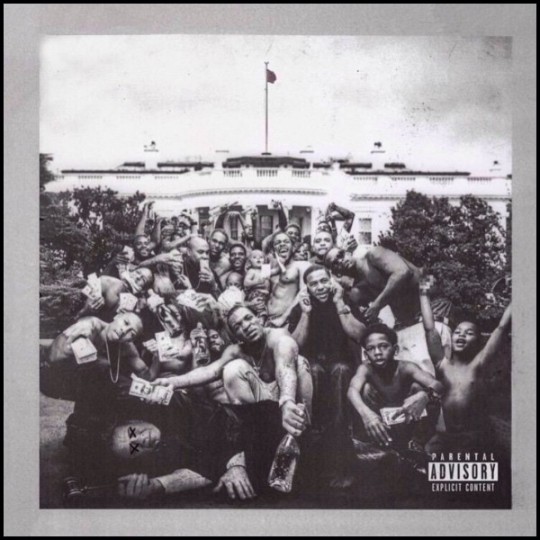
Kendrick Lamar caught the attention of the zeitgeist with his generation defining sophomore LP, Good Kid, M.A.A.D. City, but that record’s follow-up, To Pimp a Butterfly, cemented his status as one of the definitive musical auteurs of his generation. Whereas the former record was a gripping street epic that seamlessly tucked a coming of age story into the larger fabric of a blockbuster west coast hip-hop record, the latter record blew open the history of black music and wove together a tapestry of disparate styles that congealed to express a more multi-faceted look at the black experience. The beats are composed of live instrumentation courtesy of Terrance Martin, Kamasi Washington, Thundercat, and a plethora of the west coast jazz elite, and they span the likes of jazz, r&b, soul, and funk alongside instrumental hip-hop without showing the seams. The music runs the gamut from uplifting anthems (“Alright”) to bouts of unbridled fury (“The Blacker the Berry”), and everywhere in-between, but thanks to Kendrick’s deft pacing and execution nothing sounds out of place, and there’s no mistaking these songs for the work of anyone else through sheer scope alone. Kendrick’s writing and rapping had increased considerably since GKMC, but throughout TPaB he spends less time trying to prove what a capable rapper he is, and far more time using his ability to explore the nuances of systemic racial issues through the lens of a plethora of different characters. TPaB couldn’t have possibly sounded more out of step with the zeitgeist upon its release, but in venturing beyond what hip-hop in the mid 10s sounded like, and exploring perspectives beyond those of himself, he was able to tap into something far more universally human.
Throughout the course of TPaB Kendrick tackles a wide plethora of topics with music that’s matches the breadth and scope of his thematic ambitions. The g-funk strut “King Kunta” is one of the most immediate songs in his career, and he juxtaposes the song’s infectious backdrop against verses that evoke the resilience of Kunta Kinte in the novel Roots as a through line for the jarring shift he experienced throughout his come-up after growing up in poverty. “u?” brilliantly distills the sort of tragic survivor’s guilt that Kendrick experienced in the wake of his success watching so many of his friends continue to succumb to the perils of systemic racism through harsh free-jazz arrangements, while “i” gains power within the context of the record as an uplifting neo-soul anthem of self-love after the preceding storm has subsided. The uplifting anthem “Alright” has become a canonical protest song in the wake of civil unrest as a result of excessive police brutality while the finale, “Mortal Man”, begins with some of his strongest verses to date before transitioning into a fabricated interview with 2Pac. There’s an absurd amount to unpack within the songs on TPaB, but the album never buckles under the weight of its ambition, and delivers performances that are striking at every turn. Kendrick never shies away from depicting the devastating realities throughout the history of the black American experience, but he finds reasons to persist through these tribulations in the power of community, god, and love.
Essentials: “The Blacker the Berry”, “u”, “Wesley’s Theory” ft. George Clinton
11. Lonerism- Tame Impala

On Tame Impala’s debut, Innerspeaker, the band proved adept at piecing together the finest moments from their record collections into strange, idiosyncratic new shapes, but on their sublime sophomore LP, Lonerism, they began to push their sound into the present moment. The flanged guitars, shuffling drum rhythms, and frontman Kevin Parker’s Lennon-esque falsetto are a hallmarks of classic psychedelic rock, but the spellbinding synth textures, evocative samples, and cavernous production showcase a definitively 21st century sensibility. There was no mistaking them for a pure homage act on Lonerism. With the exception of piano on a few tracks courtesy of Jay Watson, and a spoken word interlude courtesy of Melody Prochet, Lonerism was written, recorded, and produced entirely by Kevin Parker, and it helped signal a major shift from bands being the dominant artistic vehicle in indie music to the solo artist taking up that mantle. Lonerism is a perfectly paced album, and aside from a few breathers, and a few epics, it almost plays like a greatest hits set. There were signs of the disco-prog synth act that Tame Imapa developed into on a few of Lonerism’s more immediate moments, but this is still thoroughly steeped in the lineage of psychedelic rock, acid rock, and blues rock. With Lonerism, Parker began to show signs of the poptimist that he was all along, but he hadn’t yet compromised the instrumental ingenuity that he’s capable of for a strong melody, and so here you get the best of both worlds; the band’s sharpest hooks and most adventurous production. Lonerism is where Tame Impala evolved from a promising project with immense potential into one of the defining musical acts of Parker’s generation.
Lonerism is a record that completely lives up to its title as a concept record about isolation. Every song here finds Parker grappling with some aspect of self-imposed isolation set against hazy, psychedelic pop/rock instrumentation. Some songs like, the disarmingly immediate “Feels Like We Only Go Backwards” spells out his anguish explicitly, with a love interest that he keeps falling for against his best judgement, while “Endors Toi” finds Parker rejecting the hardships of reality for the bliss that’s only possible when you’re literally dreaming. The lyrics rarely go deep, but on a record like this they’re entirely beside the point. Thankfully Parker’s writing works superbly within the context of the concept without detracting from the instrumentation and production. Parker wrote a few strong hooks on IS, but they were the exception, not the norm. On Lonerism, Parker’s melodic intuition had fully blossomed, and the hooks on songs like “Elephant”, “Why Won’t She Talk to Me”, and “Feels Like We Only Go Backwards” were more immediate, and more memorable than anything on the top 40 at the time. The songs on Lonerism are bursting with sonic personality; whether we’re talking about the euphoric streaks of synth that send “Apocalypse Dreams” into the stratosphere, the phaser-smeared guitars and immersive samples that bring “Sun’s Coming Down” to its triumphant finale, or the propulsive drum fllls that propel “Endors Toi”, Lonerism is the most sonically rich record that Parker has ever released. Parker would achieve more audacious and unexpected heights on his superb 2015 follow-up, Currents, but he has yet to top Lonerism’s consistency, and near perfect balance between studio experimentation and pure pop craftsmanship.
Essentials: “Nothing That Has Happened So Far Has Been Anything We Could Control”, “Sun’s Coming Up”, “Apocalypse Dreams”
10. Flower Boy- Tyler, the Creator

Flower Boy may not have come as a surprise to those who closely followed Tyler Okonoma’s progression from the lo-fi hardcore hip-hop days of Bastard and early Odd Future through his chaotic, candy-coated third LP, Cherry Bomb, but for the casual listener it may have seemed like an unthinkable evolution. And no one could have predicted its consistency. The signs of Tyler progressing into melodic, psych-leaning neo-soul were on the wall as early as his terrific 2013 record, Wolf, but on FB his melodic sensibilities, compositional chops, and an increasingly empathetic outward writing perspective all coalesced into an idiosyncratic tapestry of vibrant sound and color unlike any hip hop record ever recorded. It’s the first time that Tyler’s chops had fully caught up with his ambition, allowing him to completely deliver on the promise of a truly genre-adverse opus that Cherry Bomb merely hinted at. The lyrics are somber, and reflective, demonstrating Tyler’s newfound sense of maturity that would have been unthinkable throughout the early OF days. The sincerity and vulnerability of the lyrics go a long way towards heightening the potency of his vibrant, melodically rich compositions. FB capitalizes on all the strange contradictions that have always been inherent in his music, while removing the adolescent excess that have bogged down each prior release. The result is a highwater mark for what hip-hop and neo-soul can sound like unbridled with concern for what music should sound like. That attention to detail and unrelenting creative spirit are what helped propel FB into being the classic record that it ended up being.
Eschewing the lo-fi Neptunes meets MF DOOM beats of his past records, Tyler landed on a perfect blend of neo-soul synths, jazz strings/horns, and drums that split the difference between classic boom-bap and mid-10s trap for FB. The music is bright and vibrant, with a wealth of detail tucked within each mix that rewards multiple listens. There are songs that are completely in Tyler’s wheelhouse, like the frantic, mid-album trap cut “I Ain’t Got Time!”, and a few like the show-stopping psychedelic soul ballad, “Garden Shed”, that dramatically expand the parameters of his sound, but they all cohere together superbly into a fully-realized kaleidoscope of sound. Even the songs like “Pothole” and “November” that seem like more run of the mill Tyler cuts showcase a renewed sense of focus and tight production that belie their simple construction. FB is a record that’s focused on unrequited love, and while themes of abandonment, disillusionment with fame, growing pains, and insecurity emerge as on past records, the bulk of the action is focused on Tyler coming to terms with both his bisexuality and the anguish of a missed connection. Rarely does heartbreak sound so unflinchingly, thrillingly alive. True to form, the music is never mopey or saccharine, but it’s always brimming with the intensity of young love. FB is the record that Tyler has always set out to make, and while I’m sure he’ll top it at some point, it currently stands at the definitive realization of his singular vision.
Essentials: “911 / Mr. Lonely” ft. Frank Ocean & Stevey Lacy, “Garden Shed” ft. Estelle, “See You Again” ft. Kali Uchis
9. Until the Quiet Comes- Flying Lotus
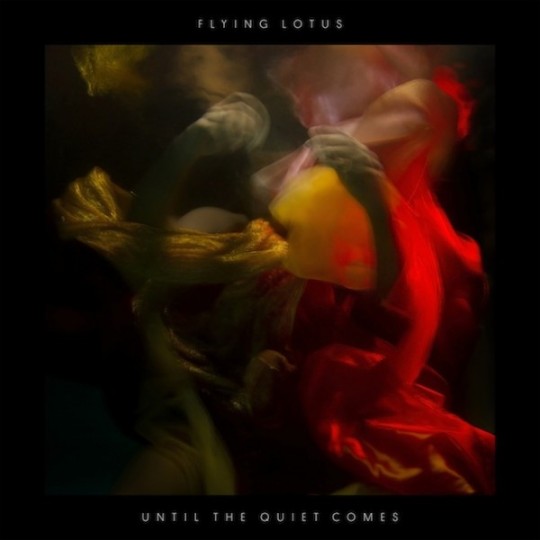
After Steve Ellison, aka Flying Lotus, dropped his masterful third LP, Cosmogramma, it seemed like he could take his sound anywhere, but doubling down and improving on the maximalist excess of Cosmogramma would have proved a near impossible task. Thankfully, on his stellar follow-up LP, Until the Quiet Comes, FlyLo swung all the way in the opposite direction, and despite it being the flavor of the decade minimalism rarely ended up sounding better on any other artist. UtQC is a minimalist electronic jazz/instrumental hip hop record with dreamy meditative arrangements that belie their complexity at every turn. The album is a concept record that finds FlyLo exploring the realms of human consciousness coupled with ambitious arrangements and immersive production that complements his thematic ambitions perfectly. FlyLo is still making beats in a traditional sense, but the compositions on this LP are more rich and varied than the entire discography of most producers, and the music he draws from spans the likes of ambient, psychedelia, r&b, post-rock, progressive rock, and meditative astral jazz as much as his usual instrumental hip hop, IDM, and free jazz touchstones. And so while UtQC is more insular, less immediate, and more likely to necessitate multiple listens than any other record of his, it’s the best showcase of FlyLo’s versatility, melodic intuition, and use of texture.
The compositions are short and sweet, and barely last longer than it takes for FlyLo to introduce an idea, tweak it, thwart expectations, and move on. Like on Cosmogramma, UtQC incorporates live instrumentation weaved throughout various compositions (Thundercat’s bass playing was cemented as a staple element of FlyLo’s sound here) as well as vocal features from the likes of Thundercat, Thom Yorke, Laura Darlington, and Niki Randa. The features are all utilized tastefully, and heighten the potency of the existing arrangements without detracting too much. There are songs like “All In” and “Yesterday/Corded” that just feature FlyLo alone constructing remarkable, lived-in soundscapes from his usual toolkit of drum machines, samplers, sequencers, and keys, while others like the title track and “DMT Song” that commit thoroughly to their minimalism, and coast effortlessly around strong melodies or guest vocal performances. Many of these songs retain the visceral low-end and celestial sweep of his best work, but they don’t serve to overwhelm and disorient as much as they sedate and mesmerize. “Getting There” hits the sweet spot, with and infectious, heavy-hitting low-end juxtaposed against Niki Randa’s sweeping falsetto. UtQC may not go for the jugular as FlyLo’s prior two records, but it’s just as captivating in its own quietly confident way.
And a few of the songs on the back half of the record are some of the most gorgeous that FlyLo has ever composed. The loose and dreamy “Only if You Wanna” provides a simple but sublime bridge from the drum and bass rush of “The Nightcrawler” into the droning r&b mirage with Yorke’s vocals wafting eerily through the crevices in the mix. From there the record moves into “Hunger” and “Phantasm”, two songs that skew the closest that FlyLo has ever veered toward straight up ambience, and they slowly unfurl into gorgeous, unpredictable string progressions as Niki Randa and Laura Darlington deliver understated, ethereal vocals, respectively. From there we’re led into “me Yesterday//Corded”, one of the strongest songs that FlyLo has released to date. It begins in the same somber, minor-key tone of the preceding songs before erupting into a cosmic drum and bass coda with a euphoric melody and pitch-shifted vocals. The final song, “Dream to Me” is a whirring synth and woodwind lullaby that brings everything full circle, leading us right back into the intro, “All In”. UtQC breezes by in nearly 47 minutes, but there’s another singular, self-contained universe of detail packed into this record’s spellbinding grooves.
Essentials: “yesterday//Corded”, “Electric Candyman ft. Thom Yorke”, “All In”
8. Carrie & Lowell- Sufjan Stevens
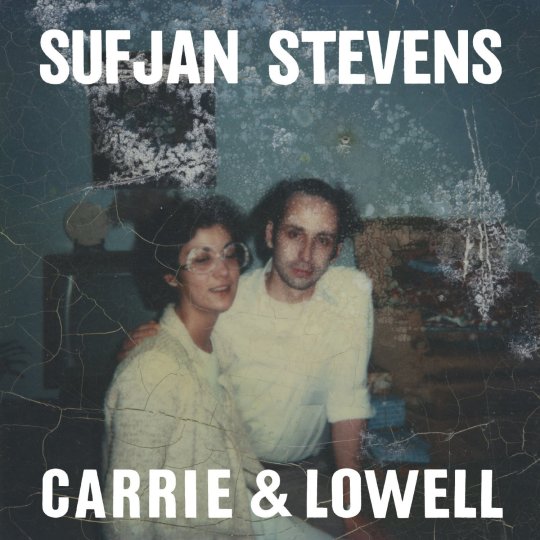
By the time that Sufjan Stevens released Carrie & Lowell he had already released several classic records and had undergone several stylistic change-ups, but nothing in his discography established the precedent for a masterwork quite like C&L. On C&L Sufjan returned to the sparse chamber folk sound of his superb fourth record, Seven Swans, but he replaced the short vignettes and character studies that peppered that record with an engrossing scope that centers around his tumultuous relationship with his late mother who suffered from substance addiction and schizophrenia. The music is hushed, and minimal, consisting of little more than finger plucked guitar, banjo, ukulele, and an assortment of strings underneath Sufjan’s tender delivery. His music has always radiated a sense of overwhelming empathy, and so when plumbing the depths of his psyche for memories of his mother the tone is often devastating and cathartic in equal measure, but never overly morose or self-pitying. With C&L Sufjan succeeded in honoring his mother’s memory as honestly and as faithfully as he could while his songwriting hit a new peak.
C&L sustains an almost overwhelming poignancy throughout its duration, but it’s never a slog. The heaviness of the sentiments never really subsides, but these songs are each filled with strong hooks, sweeping melodies, and a disarming directness that he’s never quite managed on prior records. Songs like the opening cut “Death with Dignity”, “Should Have Known Better”, and “The Only Thing” soar with warm, infectious hooks and nimble guitar arrangements alongside a few electronic and orchestral embellishments, while songs like “No Shade in the Shadow of the Cross” and “Fourth of July” bring the tempo to a crawl and bask in Sufjan’s falsetto and minor-key acoustic guitar arrangements. It all comes to a head on the devastating centerpiece “No Shade in the Shadow of the Cross”, as Sufjan depicts the self-destructive behavior he engaged in right after his mother’s death “There’s blood on that blade/Fuck me, I’m falling apart/My assassin/Like Casper the ghost/There’s no shade in the shadow of the cross” just so that he could feel closer to her.
Essentials: “No Shade in the Shadow of the Cross”, “Death with Dignity”, “The Only Thing”
7. Some Rap Songs- Earl Sweatshirt

Earl Sweatshirt was arguably the greatest living rapper before dropping his magnum opus, Some Rap Songs, but since its release it’s become much harder to dispute. On SRS Earl runs through 15 songs in 22 minutes, delivering sometimes little more than a hook and a verse per song before transitioning into the next one. The songs operate according to their own logic, and forgo traditional song structure for a loop-based compositional approach. Earl produced the bulk of the record himself, and heavily opted for dusty, de-tuned pianos, shuffling, lo-fi percussion, and a plethora of discordant texture. Earl’s precision is remarkable, and what may initially scan as awkward or clumsy flows slowly reveal themselves to be masterfully sidestepping the rhythms entirely. But for all its challenging aspects, SRS is hardly a precious, posturing sort of record. It demands your full attention, but will reward it several times over.
The songs throughout SRS are bleak missives from a remarkable talent unpacking years of trauma. The record tackles many of the same themes of abandonment, drug abuse, and depression as his past records, but he’s cut out any lingering excess in his prose, distilling only what’s absolutely necessary into each bar. The rapping is lean, and virtuosic, but never showy, and the brevity of the songs themselves is indicative of how succinct and substantial the music there is. Songs like “Red Water” have just a single couplet that he repeats a few times as the ebb and flow of the instrumental sustains the onset momentum, while other songs like “The Mint” are closer to convention, but still unfold along unpredictable loops, and verses that zig zag in and out of the mix at irregular intervals. There are songs like “Cold Summers” and “The Bends” that are the closest that Earl comes to rapping accessibly, and there are those like “Playing Possums” and Peanuts" that owe more to tape loops, ambient, and noise music than anything resembling hip hop. SRS and it’s follow-up EP, Feet of Clay, are easily the most challenging, experimental, and divisive records that Earl has released to date, but they’re also singular masterworks that push hip hop into stranger, and more human realms.
Essentials: “Peanut”, “The Mint” ft. Navy Blue, “December 24”
6. New Bermuda- Deafheaven
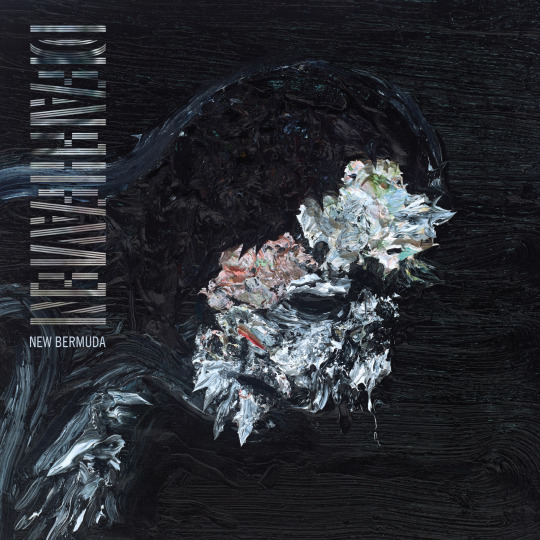
After releasing their superb second LP, Sunbather, Deafheaven had become one of the most acclaimed metal bands of the century, and had achieved a level of popularity unprecedented for metal bands. Never mistaken by anyone as purists, Deafheaven began their career flirting with through lines between shoegaze, black metal, and post-rock before tastefully combining them on Sunbather. While they easily could have churned out another LP of post-rock/blackgaze of the same stripe, the band went deeper and darker, and re-emerged with their third LP, New Bermuda, the heaviest, and arguably most melodic, record of their career to date. Across five songs that collectively clock in around 46 minutes Deafheaven continue to expand their parameters of their sound, incorporating heavier tremelo guitars, incendiary blast beats, and sweeping post-rock passages that are more adventurous, expansive, and gorgeous, than what any other bands are doing today. NB may lean the furthest towards the brutality of classic black metal, but the band’s 2015 onslaught still amplifies an immense feeling of transcendence alongside the terror.
Opener “Brought to the Water” rustles to life with the ominous sway of church bells before its lead guitar riff kicks into gear, foreshadowing the premium they place on atmosphere with foreboding timbres. Throughout the next several minutes the band continue to build a scorched earth black metal composition bristling with distortion and rapid fire drumming that eventually slyly segues into a sugary breakdown reminiscent of “Kiss Me” by Sixpence None the Richer. It’s disarming, and unprecedented, but a perfectly logical evolution of their sound that reaffirms their status as the most versatile band at the vanguard of contemporary black metal. “Luna” and “Come Back” are two of the heaviest songs that Deafheaven have ever released, and get a ton of mileage out of their seismic guitar riffs and pummeling percussion, while “Luna” boasts one of the loveliest melodies they’ve ever penned, gliding alone a star-dusted, stratosphere-bound guitar riff. Closer “Gifts for the Earth” is a succinct culmination of the preceding 38 minutes, capped off with their most cathartic coda to date with jangly guitar and minor key piano softly swirling around Clarke’s feral shrieks. The warmth exuded beneath Clarke’s shrapnel-laced delivery posits Deafheaven as a band executing well-beyond the scope and limitations of metal.
Essentials: “Gifts for the Earth”, “Brought to the Water”, “Luna”
5. Halcyon Digest- Deerhunter

By the time that Deerhunter geared up to record their fifth LP, Halycon Digest, they already had a rich body of work behind them, but very little of their music set the kind of precedent for where they would go on HD. Here, Deerhunter tapered down their most avant-garde impulses in favor of cleaner guitar arrangements and big, bright melodies, unearthing the pop band they’ve always been at their core with poise and aplomb. The walls of guitar noise, ambient interludes, and studio effects that had defined their previous releases became relegated to marginal aspects of their song craft, and they began opening up their songs like never before. Thankfully, they didn’t dilute their sound, they just cleaned it up, and the 11 songs that make up HD are the most immediate, and richly produced (thanks to Ben Allen, who produced this record after nailing Animal Collective’s Merriweather Post Pavilion a year prior) of Deerhunter’s career to date. Deerhunter’s shift towards accessibility only seemed to accentuate their inherent strangeness, and HD remains one of the most engaging and endlessly replayable indie pop records of the 21st century.
From the droning low-end thump that ignites opener “Earthquake” it’s clear something substantial has shifted. Allen’s biggest contribution was a heightened low-end that caused Josh Fauver’s bass to really pop without distracting too much from the rest of the arrangements. This extra oomph propels songs like “Don’t Cry” and “Coronado” well into infectious, anthemic territory while it helps ground more ambitious cuts like “Helicopter” and “Desire Lanes”. Frontman Bradford Cox had completely grown into his role as a charismatic, provocative frontman with the pipes and poetic disposition to back up the antics, and propel his band towards a stadium sized sound even if they would never end up touring them. Bradford’s vocal melodies on closer “…He Would Have Laughed” and centerpiece “Helicopter” are the strongest that the band ever penned, while he delivers two of his most impressive vocal performances on the lulling “Sailing” and the pensive “Earthquake”. The closer, a tribute to the late Jay Reatard, is perhaps Deerhunter’s finest moment to date, with Bradford spinning surreal couplets “I live on a farm, yeah/I never lived on a farm” around the band’s steady harpsichord pulse until the composition bursts with euphoria, and then slowly begins to fade out before cutting out abruptly. Deerhunter have never made a bad record, but HD was the last time they showed how simultaneously adventurous and immediate pop music can be.
Essentials: “He Would Have Laughed”, “Helicopter”, “Desire Lanes”
4. Black Messiah- D’Angelo & The Vanguard

In the years following D'Angelo’s spectacular second LP, Voodoo, it seemed increasingly likely that he would never release another record. But then in the twilight days of 2014 D'Angelo surprise dropped his 3rd and best LP to date, Black Messiah, with a new band supporting him called The Vanguard (which consisted of Questlove on drums, Pina Palladino on bass, Isaiah Sharkey on guitar, Roy Hargrove on horns, and a handful of other musicians). BM eschews the warm r&b/neo-soul solo singer-songwriter sound of the first two D'Angelo LPs in favor of a fiery cocktail of avant-garde soul, jazz funk, and psychedelic r&b that’s simultaneously more abrasive and experimental than anything he had done prior. D'Angelo still has a remarkably agile falsetto, but it’s been notably weathered by the years away, and it now has a grainier disposition that happens to be a much better fit for the songs throughout the record. The band’s chemistry is just remarkable, and it’s hard to believe that they weren’t all cutting records with each other for decades prior. Unlike most artists that come back with new work after a notable dry spell, D'Angelo has never sounded more human than he does on this latest LP of his. Thankfully, despite the years apart D’Angelo hasn’t lost an ounce of his remarkable talent, and brings a magnetic charisma, sublime range, and a much sharper point of view to songs that reflect the turmoil of the preceding years of unrelenting police violence, yet respond in a multitude of ways. The Vanguard prove to be an ideal backdrop for D’Angelo’s songwriting, and together they achieve a new standard for neo-soul.
Although it had been 14 years, D'Angelo’s return felt right on time in the immediate wake of the deaths of Eric Garner, Michael Brown, Tamir Rice, and plenty of others at the hands of the police. While D'Angelo’s music has never shied away from political statements, BM is by far the most explicitly political record of his career. “1000 Deaths” opens to a sample of a Khalid Abdul Muhammed speech about Jesus being black and quickly gives way to a visceral, funk rock rhythm and red-lining guitars with D'Angelo dissecting the difference between courage and cowardice “Because a coward dies a thousand times/But a soldier just dies once”. On the following track, “The Charade”, D'Angelo opts for searing soul that builds into his most anthemic melody to date while he delivers devastating imagery of the cruelty still inflicted on black people all over the world “All we wanted was a chance to talk/‘Stead we only got outlined in chalk” while “'Til It’s Done” contains D'Angelo’s finest melody to date and finds him questioning the nature of our existence and whether we’re really reckoning with the way that capitalists are destroying our planet “Perilous dissidence evening up the score/Do we even know what we’re fighting for?”. He also delivers some of his best love songs to date, including the funky mid-tempo shuffle of “Sugah Daddy”, the tender soul ballad “Betray My Heart”, and the spellbinding centerpiece “Really Love”. These songs fold neatly within the larger fabric of the record as a whole, and complement the politically charged songs without breaking the greater aesthetic. D'Angelo’s conviction is palpable throughout it all, and the newfound wisdom that he accrued in the years since Voodoo enrich the perspective that he brings to the songs in such a generous, humble way. Even if D’Angelo never releases another record we couldn’t have asked for a better swan song from him.
Essentials: “’Til It’s Done”, “The Charade”, “Really Love”
3. MBV- My Bloody Valentine

Like D'Angelo, it didn’t seem likely that My Bloody Valentine would ever follow-up their masterful second LP, but 22 years after the release of Loveless, in the dead of February 2013, MBV, the third My Bloody Valentine, finally emerged. There are 9 songs here, and they can neatly divided into three sections that find the band progressing from an extension of what they were doing in the 90s to styles never associated with them. MBV picks up right where Loveless left off, beginning with expansive suite of shoegaze songs rendered with the kind of sublime texture and tone as we’ve come to expect from the group, and slowly but surely they branch out into psychedelic pop, ambient, and pure noise, realms they’ve teased in the past but have never quite committed to prior. You can hear the band straining against their limitations, and although seeking out perfection is a fools errand, they nearly achieve it.
There’s no mistaking MBV as the work of any other band, but here they’re painting in darker, bolder hues than they’ve used in the past. Beginning with the opening song, “She Found Now”, their sound is much richer, and more forlorn, than it’s ever sounded, with thick plumes of guitar washing over wispy androgynous vocals and faint, skeletal percussion. Even as the tempos increase and the melodies begin to peak out beneath the fuzz, that wistful, melancholic tone remains. “Only Tomorrow” amps up the tempo with a driving rhythm and scorching guitars perpetually firing into the red
while “In Another Way” is a bludgeoning slice of driving noise pop with a strong melody from guitarist Belinda Butcher. “Nothing Is” coasts off the hypnotic repetition of its bludgeoning guitars for 3.5 minutes, and perfectly segues into the glorious noise piece, “Wonder 2”, which closes the record on a note of whirring guitars that approximate the overwhelming euphoria of first wave shoegaze, but takes the listener to much stranger places.
The nine songs throughout MBV strike a perfect balance between updating the shoegaze style that they perfected on loveless while wading into new territory, but it all hangs together beautifully. Kevin Shields and Belinda Butcher still harmonize on the bulk of these songs, and they’re ethereal delivery is still the perfect counterbalance for the aggression of the guitars. The searing slow-burn of “Who Sees You” is the peak of their vocal interplay, while on the midsection pop numbers like “New You” and “In Another Way” Butcher takes the reins and delivers two of the band’s strongest melodies to date over driving percussion and sleigh bells. The relative immediacy of “New You” is new sound for the band, and they completely deliver on its hypnotic pop premise. “Is This and Yes” and “Nothing Is” are the two instrumentals at the polar ends of the band’s sound that perfectly balance out the more dynamic songs, and the aforementioned noise piece “Wonder 2” complements the opening song “She Found Now” perfectly in that it’s an exploration of what My Bloody Valentine might explore more of if they ever release a fourth LP. It’s a miracle that MBV even exists in the first place, so the fact that it’s this good is just icing.
Essentials: “Only Tomorrow”, “New You”, “In Another Way”
2. Blonde- Frank Ocean
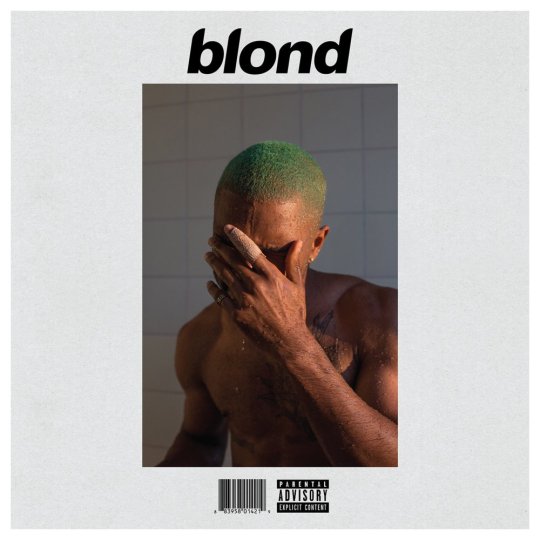
After releasing his generation defining 2012 debut Channel Orange, it was hard to say where he was going to take his music next. A cryptic series of videos in mid-August 2016 featuring Frank building a ladder led to few clues, but at the end of this week we received an audio-visual album titled Endless. Before anyone could really acclimate themselves to sleek, genre-agnostic minimalism of Endless, the proper follow-up to CO, titled Blonde, released a day later. Whereas CO was the sound of a singular talent discovering what he can do, Blonde is the sound of that talent capitalizing on those gifts with unparalleled precision. On Blonde Frank opts for a striking minimalist palette of psychedelic pop, avant-garde soul, ambient, and jazz, that are off-kilter and adventurous without sacrificing the warmth of his past work. Like CO, Blonde primarily explores themes of nostalgia, heartbreak, identify, and the nature of human perception, and here his eye for detail and attention to detail remains unmatched by any songwriter of the last decade.
From the opening song “Nikes”, Blonde presents itself as a drastic stylist departure from what Frank was doing prior. The first half is a distorted r&b dreamscape with Frank crooning in a pitch-shifted higher register, and actually has him rapping a few verses, before returning to his normal register. Blonde is filled with strange, yet tasteful stylistic touches like this, from the distorted shrieks at the end of “Ivy”, to the collapsing, pitch-shifted orchestra that gives way to an eerie children’s choir’s on “Pretty Sweet”, the album rarely shifts into anything that scans as conventional. “Pink and White” is the most straight forward moment on the album, but the verses rarely stay grounded, and soon give way to a soaring chorus that slyly tucks Beyonce’s voice into the fold before the instruments dissolve from the mix entirely. “Skyline To” and “Godspeed” flirt with ambience and put a great deal of emphasis on exploring texture and negative space, while “Close to You” is a brief, glitchy cover of Stevie Wonder’s classic that provides a terrific segue from the “Facebook Story” interlude into the record’s devastating centerpiece, White Ferrari. The record covers a remarkable amount of ground sonically, but it coheres in a way that completely belies this scope.
“Nikes” sets the tone for the record on the whole as Frank watches his friends lose themselves to the spoils of his fame and begins to recognize himself as a placeholder for a partner’s lost love. “Self-Control” depicts the story of one of Frank’s relationship’s imploding “I’ll be the boyfriend in your set dreams tonight/Noses on a rail, little virgin wears the white” set to a mesmerizing neo-soul slow-burn that unfurls a gorgeous, understated melody while “Nights” juxtaposes the highs of the come-up “Oooh nani nani/This feel like a Quaalude” with a guitar pop/boom-bap instrumental and the perils of fame with a woozy, cloud-rap adjacent second half “Shut the fuck up I don’t want to hear your conversation/Rollin” marijuana that’s a cheap vacation". The record hits its peak with the spectacular ballad, “White Ferrari”, the strongest song of his career to date. Over warm acoustic guitar provided by Alex G Frank details the permanence of the love that he’ll have for someone that he’s no longer in a relationship with “I care for you still and I will forever/That was my part of the deal, honest/We got so familiar”. The humility and humanity of the moment is heartbreaking, and speaks volumes about the depths of Frank’s artistry. Blonde set a new benchmark for avant-garde pop, and is arguably the most influential album of the past decade.
Essentials: “White Ferrari”, “Nights”, “Self-Control”
1. Cosmogramma- Flying Lotus

After breaking through with his superb sophomore LP, Los Angeles (a singular blend of IDM, trip-hip, and woozy Dilla & Madlib-esque instrumental hip-hop) it would have been easy for Flying Lotus to continue mining the same sounds for successive records that were just slight variations on that singular template. But for FlyLo’s third LP, Cosmogramma, he blew his sound wide open, eschewing the quantized beat grid for a lusher, more sprawling sound that couldn’t be confined to standard rhythms. Cosmogramma is steeped in the lineage of instrumental hip hop and IDM like its predecessor, but it manages to juggle a wider palette of disparate styles such as four on the floor, drum and bass, jungle, free-jazz, and experimental bass while incorporating a wide variety of guest musicians that do a superb job of fleshing out his expansive compositions. Cosmogramma is a record that can barely contain its ambition, and despite having been released over a decade ago it still shines like a beacon illuminating the boundless possibilities of where music can go.
The sublime fusion of the live instrumentation, supplied by Thundercat on bass, Miguel Atwood-Ferguson contributing string arrangements, and Ravi Coltrane providing tenor saxophone, among many others coupled with FlyLo’s mind-warping production is what gives the album it’s compelling thrust. The first half primarily splits the difference between frantic drum and bass/synth-pop heaters and atmospheric cosmic-jazz interludes, and the pacing is just remarkable, with no moment overstaying it’s welcome and plenty of space to give each idea the space it needs to develop. Thom Yorke drops by for a wispy vocal performance on the agile IDM strut “And the World Laughs With You” while Thundercat delivers a formal career introduction on the tender ballad “MmmHmm” before the record shifts into the infectious four on the floor centerpiece, “Do the Astral Plane”. From here the record deploys the astral jazz and eastern influences in a more pronounced fashion on songs like “German Haircut” and “Dance of the Pseudo Nymph” respectively. The celestial ambience of “Table Tennis” featuring Laura Darlington is a welcome breather for the life-affirming synth surge of closer “Galaxy in Janaki”, ending the album on a somber, but ultimately uplifting note with Flylo sampling the ventilators that his mom was hooked up to on her death bed for a euphoric, synth-streaked send-off.
The enduring appeal lies in its function as ambition existing for the sake of ambition. The songs throughout Cosmogramma all vary in texture, tempo, and tone, and they all around great on their own, but it’s the journey from start to finish that Cosmogramma exemplifies as a spiritual experience. Cosmogamma was intended to function as a loose concept album of sorts about lucid-dreaming and out of body experiences influenced by the study of the universe, heaven, and hell, and it’s remarkable to hear just how much of that vision that he’s able to convey without the prevalence of vocals. Although electronic music has changed dramatically in the decade since Cosmogramma was released, the execution of FlyLo’s masterpiece hasn’t been in matched, in electronic music or anywhere where else. Cosmogramma is both the pinnacle of where music has been, and a glimpse at the possibilities of where it could go moving forward.
Essentials: “Galaxy in Janaki”, “Do the Astral Plane”, “MmmHmm” ft. Thundercat
#Flying Lotus#frank ocean#My Bloody Valentine#d'angelo & the vanguard#deerhunter#deafheaven#earl sweatshirt#Sufjan Stevens#Tyler The Creator#Tame Impala#Kendrick Lamar#vampire weekend#car seat headrest#death grips#Grizzly Bear#Gang Gang Dance#Radiohead#St. Vincent#A Sunny Day in Glasgow#alex g#danny brown#the knife
139 notes
·
View notes
Photo
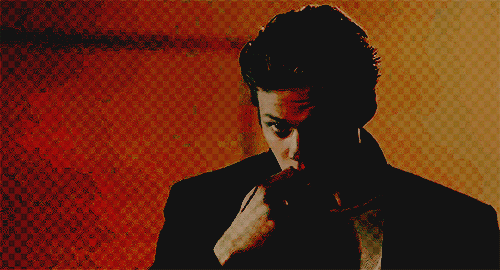
´ ・ . ✶ ⧼ bill skarsgard, cis male, he & him / the good, the bad & the dirty by panic! at the disco + deep red blood gushing from a nose that’s been broken several times over, and knuckles that seem to be permanently raw and stained black and blue. a phone screen that’s cracked beyond reasonable repair and yet, somehow, still works perfectly. putting your hand flat on a tabletop and using a grubby penknife to absently play bishop ( and stress your sister out in the process ). dirt and blood caught beneath your fingernails, and fingertips that are colored yellow from rolling your own cigarettes. ⧽ ━━ meet NIKOLAI MATHIAS CHRISTENSEN ; the TWENTY FIVE year old who has sometimes been referred to as THE ALBATROSS. they originally hailed from THE SOUTHERN ISLES where they lived with their parent, HANS CHRISTENSEN. they’ve always been pretty METICULOUS & SELF-RELIANT, but i’ve heard that they can be pretty PERFIDIOUS & PHLEGMATIC, too. it’s common knowledge that they have the power of ASTRAL PROJECTION, but i don’t know how much good it does them, as an APPRENTICE MECHANIC. you can check out his stat page HERE & his pinterest board HERE.
he has HANDS like the apocalypse ;
you could start a war with hands like that.
your life is a series of lessons that come one after the other. you learn this quickly, and understanding it serves you well.
number one.
though defined with care, family means nothing in the end. they say that there are SOME ties which bond, but you are one of few who knows that anything can break.the woman who brought you into this world proves this first and foremost, before you are even consciously aware. she abandons you and your twin sister to the mercy of a dog eat dog world, seemingly without a second thought. you do not say, but you know. if it was so easy for her to leave behind two tiny beings that had once been a part of her, it will be even EASIER for others.
number two.
you know that there are no good fathers. you know that anyone who says OTHERWISE is lying - to themselves, perhaps, but especially to you. hans christensen was not made to comfort, and though it is the one thing that children need, you learn not to. when you fall and hurt yourself, you do not run to daddy. when you imagine a monster beneath your bed, you do not share your wild creation, because you know he will not tell you it doesn’t EXIST. you love him, in a sense - in that way that evades definition. when one parent leaves, it is easy feel something for the one who stayed ; but while calling him ‘father’ slips easily from your silver tongue, his parental care ends at providing the roof above your head.
number three.
though sometimes both of you wonder if it’s something that you want : you will ALWAYS have kaela, and she will always have you. this is the gift of being born together, and the PRICE of being one soul split into two. for as long as you can remember, it has been the same way. you may look into her eyes and see your own gazing back at you, but whatever you ARE, she is not - and you know that the mind resting behind her vivid hues is where all the similarities finally end. you love her, you do, and you KNOW that she loves you too ; that no matter what you do, no matter who she BECOMES, the care you have for one another is everlasting and absolute. she is your weakness. your one soft spot. your loyalty is not a thing which can be bought - but kaela has it. she has since the womb.
number four.
learn that there is nobody with your interests at heart, and if you need something, you must get it for yourself. if you fall victim of wanting, then the same rule applies. remember what you know of the phrase ‘dog eat dog’, that which seems to rule your life from the MOMENT you are born to it. it does not matter if you must lie, steal, cheat your way to a LIFE worth living, and your father goes so far as to support such things. only the weak of mind and of WILL succumb to morals, he will tell you, and you agree.
number five.
it’s an age old saying from parent to child, but you take it heart : when someone hits you, you hit them BACK. it’s always been this way, since you were a little boy with an itch beneath his skin ( human / monster / something in between, begging to be freed ) and a temper that made nannies quit after one too many exposures. you are unique in the sense that, while your fathers rage runs hot, yours runs cold. like ice. it brims inside of you until it overflows, and once it does… no one wins. it terrifies people, watching you work. watching you break a nose without flinching, watching you hurt without REGRET. you can TAKE a punch like nobodies business, but you can throw one, too - and god help anyone who doesn’t knock you out the first time.
number six.
university is for a certain type of person, and that is not you. it never has been. if an army of private educators couldn’t instill a love of education within you, then it was already destined : you would NOT succeed in the setting walt disney university provided you, but perhaps out of misled desires for pride, you did TRY. professors hated you from the very first moment they lay eyes upon your scarred hands and heard your biting words ; but you can at least admit, to yourself, that you made some sort of EFFORT for a time. quickly it became apparent that it was not for you. when you’re expelled, most people ( yourself included ) believe it to be about time
number seven.
machines are easier than people. you know why that is. you can pull a machine apart and understand what makes it tick. nothing that it does is a surprise ; if it doesn’t serve its purpose, it is broken, and if it is, you can fix it. if it’s unfixable, it can be thrown away and replaced easily. humans are complex, and you don’t feel as if you completely understand them. you pick apart their minds in an attempt to, but you come up somewhat EMPTY. you wonder if everyone out there understands everybody else as little as you do, and whether it's normal to feel such a disconnect from them. somehow, you know the answer.
number eight.
when they MADE you, they made you wrong. they made you run colder than the average man ; they made you with an insatiable fury, a vicious, nasty RAGE that hollows you out and fills you up, all at the same time. you are good at things you understand no good man is GOOD at, so you embrace the fact that you are not good. not tender. not merciful. the lines between who you are and who you perceive yourself to be blur more and more, day by day ; you know you are feral, and you know that will never change. the only questions which remain are how far are you willing to go? and how long will you SURVIVE to get there?
SYNOPSIS ( and headcanons ) :
nikolai mathias christensen was born june 1st, 1994. he’s a TWIN ( his sister being named mikaela ), and his father is the only parent he has. as far as niko is aware, his mother abandoned them post haste.
surprise surprise : hans was not a good father. for the most part this manifested in palming niko off on nannies, and keeping himself at an emotional distance, which in turn leads to niko becoming… quite stunted, in that department.
hans could be cruel, and he expected the best. niko tried to give it. he also had a temper ( which seems to be hereditary ). he was not physically abusive towards niko, but there were a handful of… accidents. he still has a scar on his forehead from tripping over his fathers leg and cracking his temple against a mahogany table.
kaela was it for niko. the one person he had a real CONNECTION to. the one he loved, even if - especially as they’ve gotten older - that seems to be quite skewed. they can say cruel things to one another, but niko would not ( and probably has not ) hesitate to put anothers head through a window for his sister.
he isn’t ambitious, per se - he simply learned that if he was going to get anything, it would have to be gotten for HIMSELF. he wasn’t taught morals, or really… right and wrong, full stop - and his own emotional detachment means it’s no skin off his nose to lie, cheat, scam, steal, etc, if he HAS to.
he also - if you could not guess - has absolutely ZERO problem with violence. he welcomes it, in fact. he solves most problems with his fists, and is honestly quite scary to watch in action. for the most part? he wins.
got expelled in his third year of a mechanics degree for something terrible, so he’s working as an apprentice in an autoshop now and is enjoying it WAY more. school wasn’t for him, and never was.
he’s an insomniac, and it began with his powers manifesting. niko can astral project, and without much control over it, does so subconsciously when he falls asleep - which in turn means… no actual sleep gang. he doesn’t love it. kinda sucks. would not rate high on yelp.
0 notes